
The Lich
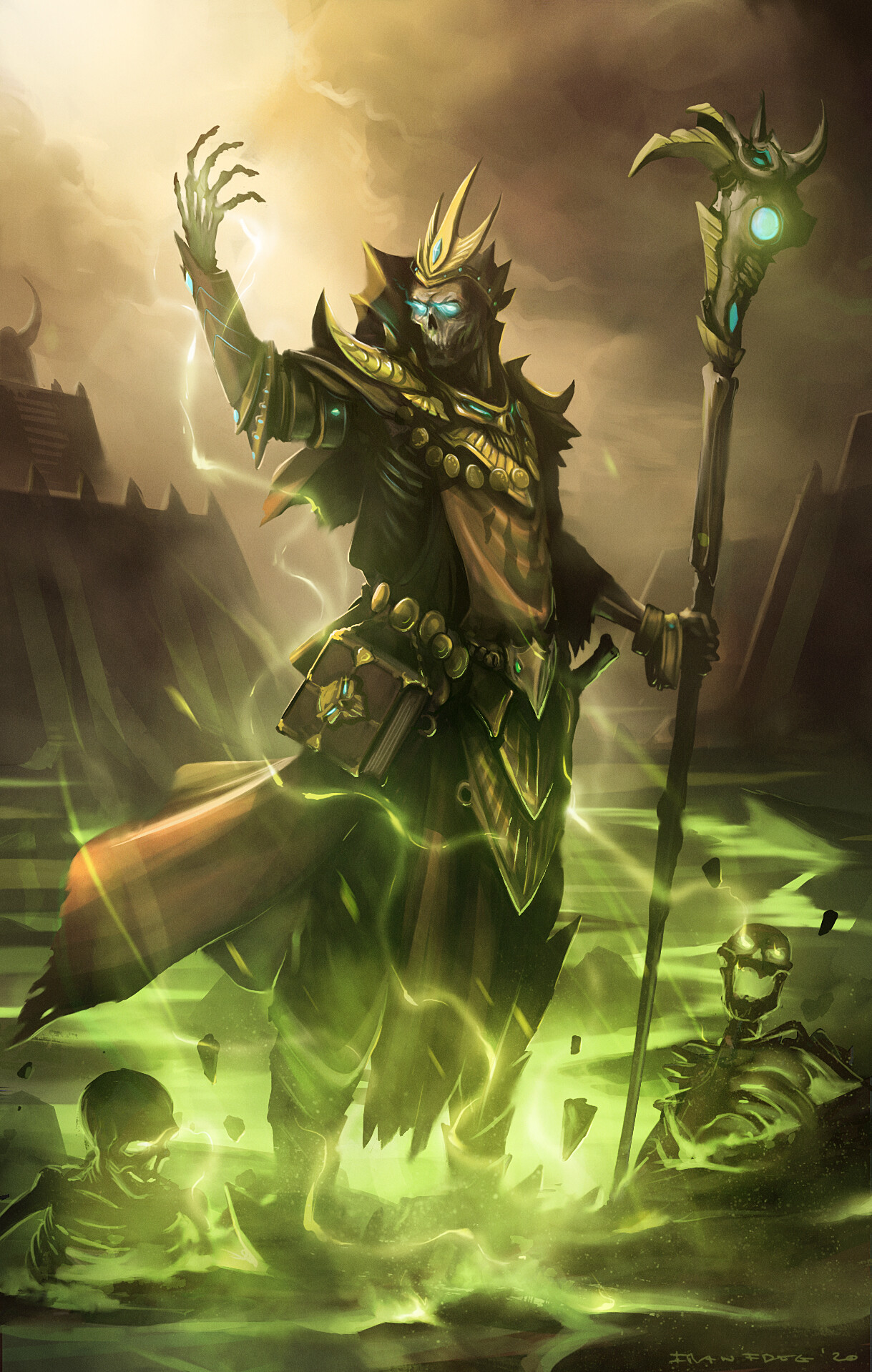

Lich Cohorts
Beneath the setting sun,
a legion's graveyard, the field's become,
below the baying horses,
two hundred bloodless corpses.
Yet amongst these men a tattered thing,
grotesque, withered, chattering,
the scourge of sun and stars,
stood alone, unmarred.
'Twas no army that culled the war,
no siege machine rain'd stone from the skies,
'twas no army, but one man,
skull, bone, and scythe in hand.
Through reaper's gaze he spoke,
death's embrace, his cloak.
-The Ballad of Lord Lazric
What is a Cohort?
In short, a creature cohort is a monster, perhaps from the Monster Manual that has been converted into its own race and associated class (which are designed to be taken together). You create a cohort much like making a character, following the same rules in the Player's Handbook. One difference, though, is that cohorts typically don't pick a character background unless the monster in question had a prior profession.
Cohorts are designed to be flexible, so that DMs can do some of the following:
- DMs can use a cohort in place of the normal "Sidekick" rules from Tasha's Cauldron of Everything, allowing an iconic monster to act as a friendly NPC or even as a party member
- A cohort can be used as a monster that levels with the party (as a recurring enemy or rival, for instance)
- Some cohorts can act as more powerful familiars, or as substitutes for animal companions (or similar class abilities)
Note: despite being mentioned above, you do not need to own Tasha's Cauldron of Everything to use cohorts.
Keep in mind that as of the time of this writing, creature cohorts are not designed for multiclassing nor balanced for such.
Aspirant Racial Features
Though you have yet to reach your full potential, you have started down the path between life and death, and are already beginning to distance yourself from the mortal world. You may have been revived in an obscure ritual, or may have intentionally transformed yourself into your current, undead state. Regardless, you are no longer limited by the weaknesses of living flesh.
Ability Score Increase. Your Intelligence score increases by 2, and one other ability score of your choice increases by 1.
Age. As an undead creature, you no longer age normally, though you do not have eternal youth either. Your form is likely dessicated, with leathery flesh and mottled hair. You otherwise appear to be similar to the age you were before your transformation.
Alignment. Your tendency to lean towards good or evil likely has to do with how you became undead. If you decide to sacrifice the souls of others to become immortal (such as through the lich's Dread Lord subclass) then you are likely irredeemably evil, as the destruction of souls is one of the most profane acts known to the world.
art by Fran Fdez
cover art by Derrick Zha
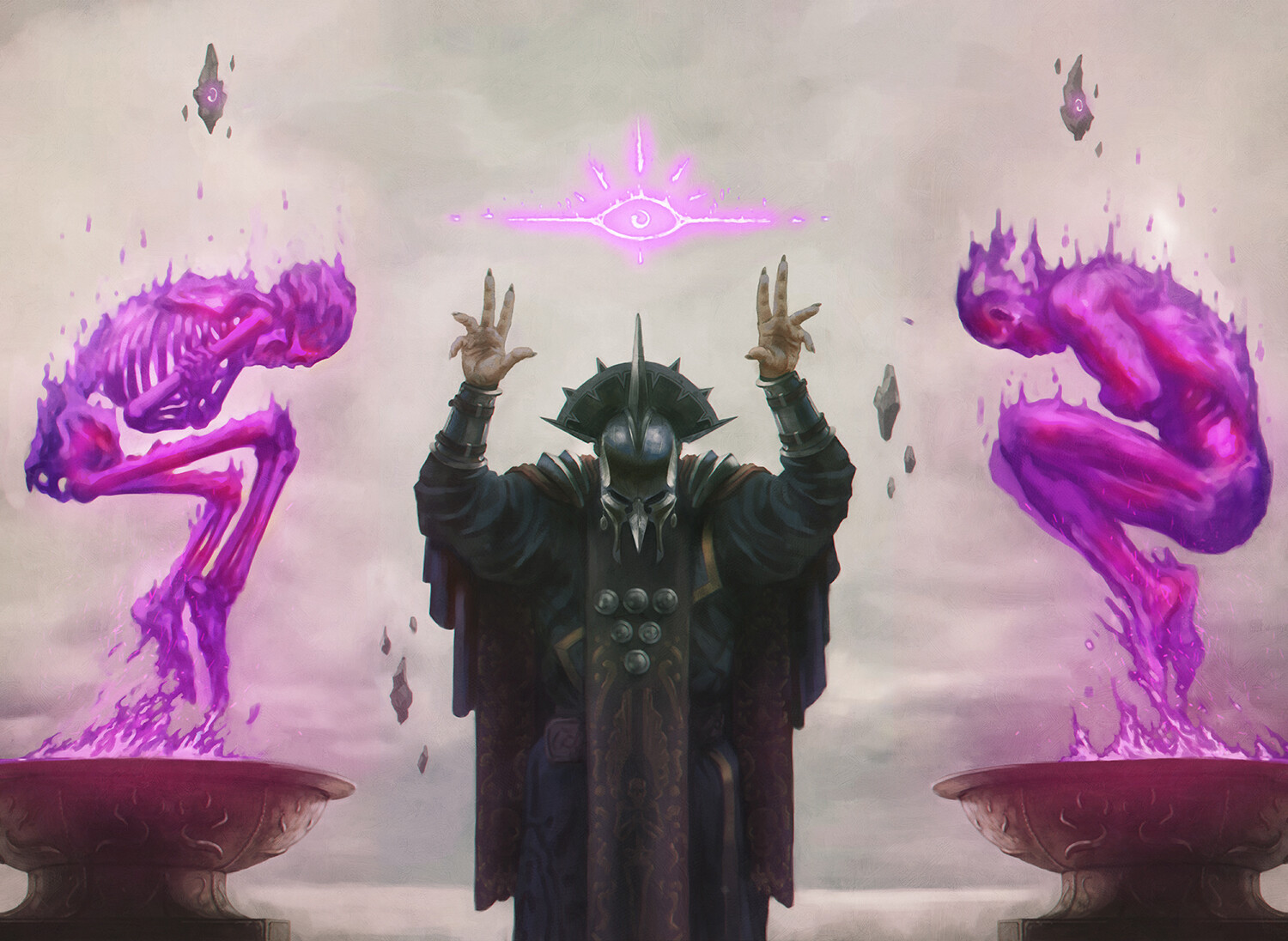

However, not all undead are evil by nature. In the plane of Eberron, the elves of Aerenal transform their most respected citizens into a type of radiant undead-- the Deathless-- who are generally good-aligned and opposed to other forms of undeath. Honored dead may wish to consider the lich subclass, the Transcendent.
Size. Your size is Medium, unless your former race was a different size by default. Your natural size does not change during your transformation to undeath.
Speed. Your base movement speed is 30 feet.
Darkvision. The eyes of the undead are well adapted to seeing in dim and dark conditions. You can see in dim light within 60 feet of you as if it were bright light, and in darkness as if it were dim light. You can't discern color in darkness, only shades of gray.
Beyond Death. You count as a humanoid as well as an undead for the purposes of spells and effects. You can be healed like a humanoid, but also turned as an undead.
Unceasing. You are immune to exhaustion effects, and do not need to eat, drink, breathe or sleep. However, whenever you take a long rest you must spend at least four hours in a motionless, trance-like state. In this state, you appear asleep, but you are not unconscious, and you can see and hear as normal.
Resilient. You have advantage on saving throws against poison, and you have resistance to poison damage.
Knowledge of the Ages. You gain one bonus proficiency of your choice, in either the Arcana or History skill.
Innate Power. You learn one wizard cantrip of your choice. Whenever you increase your level in any class, you may replace this cantrip with another wizard cantrip.
Languages. You can speak, read and write Common, and one extra language of your choice.
New Class: The Lich
Class Features
As a lich, you gain the following class features.
Hit Points
- Hit Dice: 1d6 per lich level
- Hit Points at 1st Level: 6 + your Constitution modifier
- Hit Points at Higher Levels: 1d6 (or 4) plus your Constitution modifier per lich level after 1st.
Proficiencies
- Armor: none
- Weapons: daggers, darts, slings, quarterstaffs, light crossbows
- Tools: none
- Saving Throws: Intelligence, Wisdom
- Skills: choose two from Arcana, Deception, History, Insight, Investigation, and Religion
Equipment
You start with the following equipment, in addition to any equipment granted by your background:
- (a) a scholar's pack or (b) an explorer's pack
- an hourglass and 50 gold
- a spellbook
art by David Astruga

The Lich
| Level | Proficiency Bonus | Features | Cantrips Known | Spells Known | 1st | 2nd | 3rd | 4th | 5th | 6th | 7th | 8th | 9th |
|---|---|---|---|---|---|---|---|---|---|---|---|---|---|
| 1st | +2 | Mask of Undeath, Natural Armor, Spellcasting | 3 | 2 | 2 | — | — | — | — | — | — | — | — |
| 2nd | +2 | Ascension Rite, Forbidden Lore | 3 | 3 | 3 | — | — | — | — | — | — | — | — |
| 3rd | +2 | Arcane Obscura, Frightening Gaze | 3 | 4 | 4 | 2 | — | — | — | — | — | — | — |
| 4th | +2 | Ability Score Improvement | 4 | 5 | 4 | 3 | — | — | — | — | — | — | — |
| 5th | +3 | Disrupt Life | 4 | 6 | 4 | 3 | 2 | — | — | — | — | — | — |
| 6th | +3 | Ascension Feature | 4 | 7 | 4 | 3 | 3 | — | — | — | — | — | — |
| 7th | +3 | Death Mantle | 4 | 8 | 4 | 3 | 3 | 1 | — | — | — | — | — |
| 8th | +3 | Ability Score Improvement | 4 | 9 | 4 | 3 | 3 | 2 | — | — | — | — | — |
| 9th | +4 | ─ | 4 | 10 | 4 | 3 | 3 | 3 | 1 | — | — | — | — |
| 10th | +4 | Ascension Feature | 5 | 11 | 4 | 3 | 3 | 3 | 2 | — | — | — | — |
| 11th | +4 | ─ | 5 | 12 | 4 | 3 | 3 | 3 | 2 | 1 | — | — | — |
| 12th | +4 | Ability Score Improvement | 5 | 12 | 4 | 3 | 3 | 3 | 2 | 1 | — | — | — |
| 13th | +5 | Ascension Feature | 5 | 13 | 4 | 3 | 3 | 3 | 2 | 1 | 1 | — | — |
| 14th | +5 | Shun Mortality | 5 | 14 | 4 | 3 | 3 | 3 | 2 | 1 | 1 | — | — |
| 15th | +5 | ─ | 5 | 14 | 4 | 3 | 3 | 3 | 2 | 1 | 1 | 1 | — |
| 16th | +5 | Ability Score Improvement | 5 | 15 | 4 | 3 | 3 | 3 | 2 | 1 | 1 | 1 | — |
| 17th | +6 | ─ | 5 | 16 | 4 | 3 | 3 | 3 | 2 | 1 | 1 | 1 | 1 |
| 18th | +6 | Ascension Feature | 5 | 17 | 4 | 3 | 3 | 3 | 3 | 1 | 1 | 1 | 1 |
| 19th | +6 | Ability Score Improvement | 5 | 17 | 4 | 3 | 3 | 3 | 3 | 2 | 1 | 1 | 1 |
| 20th | +6 | Master of Unlife | 5 | 18 | 4 | 3 | 3 | 3 | 3 | 2 | 2 | 1 | 1 |
Mask of Undeath
If you are not already undead, then at 1st level your appearance begins to change. Your skin may take on a deathly pallor, your eyes begin to gloss over or perhaps your hair becomes gray (if it does not fall out entirely). As you increase your lich level, you begin to look less like a living person and more so like a true undead. You can use your innate magic to conceal these changes, though... for a time.
As an action, you can make yourself appear as a younger (and very much living) version of yourself. This otherwise functions like the disguise self spell. However, whenever a creature that had close knowledge of you before you became a lich (such a family member, a close colleague or long-time friend) comes within 30 feet of you and can see you, that creature can make an Insight check at the DM's discretion. The DC is equal to 8 + your proficiency bonus + your Intelligence modifier. If the creature succeeds on the check, they can see that you somehow look even better than they remember you-- which may be seen as a good thing, or just plain suspicious depending on how trusting the creature is. A dog that formerly loved you may suddenly think of you as a stranger, while a long time friend may find you more comely than ever before. In either case, they realize something is... different about you.
You may use this ability once per point of proficiency bonus, and you recover any expended use upon completion of a long rest.
Natural Armor
Your hide is calloused by the touch of undeath. While you are not wearing any armor, your Armor Class equals 13 + your Dexterity modifier.
Spellcasting
As a former wizard, you were accustomed to keeping your arcane knowledge in written form. Using a spellbook allowed you a great many options at your fingertips. However, your transformation into a lich has changed that somewhat. On the one hand, you now have intimate knowledge of many of your spells, such that you are no longer fully reliant on your spellbook. On the other hand, you quickly learn to adapt your spell repertoire as you go (see the Forbidden Lore ability, below). You might feel restricted in your spells known, at least initially. Over time, this will become less of an issue as your ability to adapt grows further.



Cantrips
At 1st level, you know three cantrips of your choice from the wizard spell list. You learn additional wizard cantrips of your choice at higher levels, as shown in the Cantrips Known column of the Wizard table.
Spellbook
At 1st level, you have a spellbook containing four 1st-level wizard spells of your choice.
Spell Slots
The Lich table shows how many spell slots you have to cast your spells of 1st level and higher. To cast one of these lich spells, you must expend a slot of the spell's level or higher. You regain all expended spell slots when you finish a long rest.
For example, if you know the 1st-level spell burning hands and have a 1st-level and a 2nd-level slot available, you can cast burning hands using either slot.
Learning Spells of 1st Level and Higher
Lke a sorcerer, you have a vast repertoire of arcane knowledge at hand wherever you go, with or without your spellbook. Unlike a sorcerer, though, you do still retain some of a wizard's spell flexibility and can adapt over time, using your spellbook to expand your magical abilities.
You know two 1st-level spells of your choice from the wizard spell list.
The Spells Known column of the Lich table shows when you learn more wizard spells of your choice. In addition, each time you gain a lich level you can add one wizard spell of your choice to your spellbook. These spells must be of a level for which you have spell slots, as shown on the Lich table. For instance, when you reach 3rd level in this class, you can learn one new spell of 1st or 2nd level, and can also add one new spell to your spellbook of 1st or 2nd level.
In short, the spells you know are the spells you have available at any given time, and your spellbook may contain those spells that you wish to have in a pinch, but may not need accessible at all times. You do not prepare spells, but you will learn to cast spells directly from your spellbook on a limited basis (with the Forbidden Lore ability, below).
On your adventures, you might also find other spells that you can add to your spellbook (see the "Your Spellbook" sidebar).
Additionally, when you gain a level in this class, you can choose one of the wizard spells you know and replace it with another spell from the wizard spell list, which also must be of a level for which you have spell slots.
art by Vyach Milinchuk
Your Spellbook
(from page 114 of the Player's Handbook) The spells that you add to your spellbook as you gain levels reflect the arcane research you conduct on your own, as well as intellectual breakthroughs you have had about the nature of the multiverse. You might find other spells during your adventures. You could discover a spell recorded on a scroll in an evil wizard's chest, for example, or in a dusty tome in an ancient library.
Copying a Spell into the Book. When you find a wizard spell of 1st level or higher, you can add it to your spellbook if it is of a level for which you have spell slots and if you can spare the time to decipher and copy it.Copying a spell into your spellbook involves reproducing the basic form of the spell, then deciphering the unique system of notation used by the wizard who wrote it. You must practice the spell until you understand the sounds or gestures required, then transcribe it into your spellbook using your own notation.
For each level of the spell, the process takes 2 hours and costs 50 gp. The cost represents material components you expend as you experiment with the spell to master it, as well as the fine inks you need to record it. Once you have spent this time and money, you can prepare the spell just like your other spells.
Replacing the Book. You can copy a spell from your own spellbook into another book—for example, if you want to make a backup copy of your spellbook. This is just like copying a new spell into your spellbook, but faster and easier, since you understand your own notation and already know how to cast the spell. You need spend only 1 hour and 10 gp for each level of the copied spell.If you lose your spellbook, you can use the same procedure to transcribe the spells that you have prepared into a new spellbook. Filling out the remainder of your spellbook requires you to find new spells to do so, as normal. For this reason, many wizards keep backup spellbooks in a safe place.
The Book’s Appearance. Your spellbook is a unique compilation of spells, with its own decorative flourishes and margin notes. It might be a plain, functional leather volume that you received as a gift from your master, a finely bound gilt-edged tome you found in an ancient library, or even a loose collection of notes scrounged together after you lost your previous spellbook in a mishap.


Spellcasting Ability
Intelligence is your spellcasting ability for your wizard spells, since you learn your spells through a near-comprehensive level of arcane knowledge. This may be due to your ascension to lichdom alone, through years of study or through an arrangement with a powerful fiend. You use your Intelligence whenever a spell refers to your spellcasting ability. In addition, you use your Intelligence modifier when setting the saving throw DC for a wizard spell you cast and when making an attack roll with one.
Spell Save DC
Spell attack modifier
Ritual Casting
You can cast a wizard spell as a ritual if that spell has the ritual tag and you either have the spell known or in your spellbook.
Spellcasting Focus
You can use an arcane focus (found in chapter 5) as a spellcasting focus for your wizard spells. If you choose, you may instead use your spellbook as an arcane focus.
Ascension Rite
It is said that the methods used to achieve lichdom are both profane and deadly. There are also rumors of far-flung societies that have infused their honored dead with radiant immortality. At 2nd level, you choose an ascension rite to pursue-- the Dread Lord or the Transcendent-- and you gain unique abilities depending on the path you choose. Both of these ascension rites are detailed at the end of this class description.
Forbidden Lore
Beginning at 2nd level, you can use ancient, formerly lost techniques to cast spells directly from your spellbook.
Lore Points
You have 2 lore points. Whenever you level up, your maximum lore points increases by one (your lore point maximum is always equal to your lich level). You can never have more lore points than your current lich level. You regain all spent lore points when you finish a long rest.
As a bonus action during your turn, you may consume a spell slot to recover a number of lore points equal to the level of the spell slot used.
art by Xavier Leroux
Using Lore Points
At 2nd level, you can use lore points to cast a spell directly from your spellbook. The spell must be a wizard spell for which you have spell slots. To cast a spell this way, you spend a number of lore points equal to the spell's level when casting the spell. You also expend a spell slot of the spell's level. In all other ways, the spell is treated as though it were being cast normally.
In addition, whenever you would add your proficiency bonus to an Intelligence-based ability check, you may spend 1 lore point to add double your proficiency bonus to that check instead. You may choose to use this ability after the roll is made, but before the success or failure of the check is determined.
You will learn new ways to use your lore points as you level.
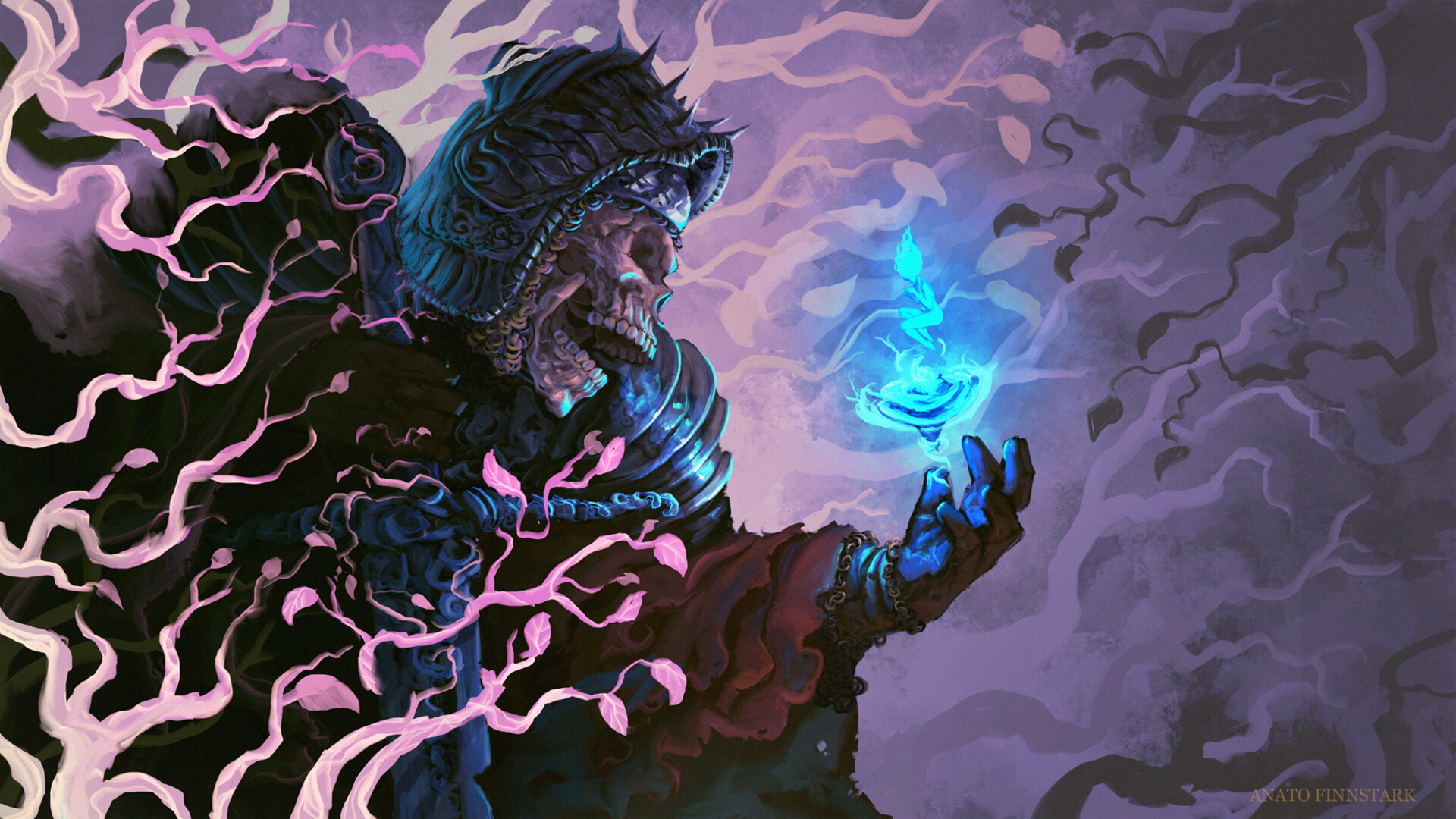

art by Anato Finnstark
Arcane Obscura
As a lich, you can draw upon knowledge lost to generations of mortals. Your dark studies have given you a view of the very underbelly of magic-- its secrets are no longer beyond your ken.
Starting at 3rd level, you gain proficiency in the Arcana skill. If you are already proficient in Arcana, you may instead choose another skill from the lich class proficiencies list. In addition, whenever you roll a 1 on an Arcana skill check, you can instead treat the roll as though it were a natural 20.
Frightening Gaze
Starting at 3rd level, you learn to inspire dread in those who oppose you. An ominous glow seeps from your eyes, halting your foe's advance as they become bathed in fear.
Whenever a hostile creature that you can see enters a space within 10 feet of you, you may use a reaction to glare at them. The target must succeed on a Wisdom saving throw against your spellcasting save DC or have their movement speed reduced to 0 until the beginning of their next turn. On a failed save, the creature also becomes frightened of you for one minute. The frightened target can repeat the saving throw at the end of each of its turns, ending the effect on itself on a success.
Constructs and undead are immune to this effect. Whenever a creature succeeds on a saving throw against this ability or when the effect ends, that creature becomes immune to this ability for 24 hours.
.
You may use this ability twice, and recover any expended use upon completion of a long rest. When you have no uses remaining, you can continue to use this ability, but must expend 2 lore points and a 2nd-level spell slot each time you choose to do so.
Ability Score Improvement
When you reach 4th level, and again at 8th, 12th, 16th, and 19th level, you can increase one ability score of your choice by 2, or you can increase two ability scores of your choice by 1. As normal, you can't increase an ability score above 20 using this feature.
Disrupt Life
In addition to embracing undeath, a lich also gains profane knowledge of spells and spell-like abilities thought lost to the ages. At 5th level, you may use an action during your turn to blast your surroundings with raw negative energy. All living creatures of your choice within 20 feet of you must make a Constitution saving throw against your spellcasting save DC. A target takes 6d6 necrotic damage on a failed save, or half as much damage on a successful one. If a target is at half of their normal maximum hit points or fewer, they roll their saving throw with disadvantage.
You may use this ability once, and recover any expended use upon completion of a long rest. When you have no uses remaining, you can continue to use this ability, but must expend 3 lore points and a 3rd-level spell slot each time you choose to do so.
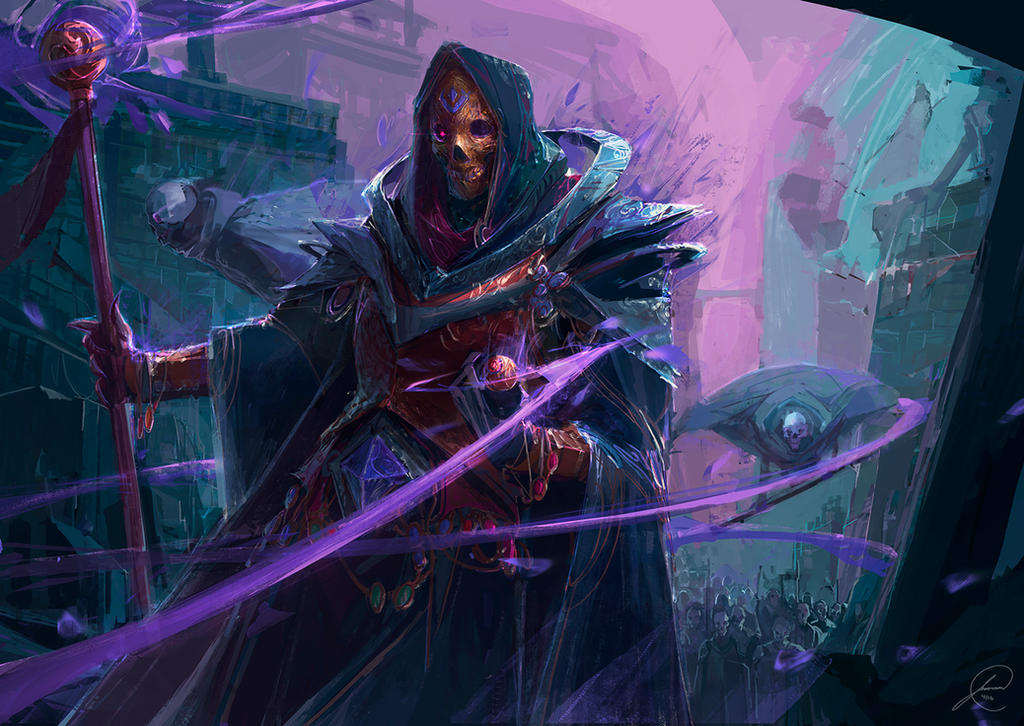

art by JasonTN
Death Mantle
Fell magic bridges the gap between life and unlife; as you distance yourself from your mortality, you become less reliant on that which once sustained you.
At 7th level, you now count as undead in addition to your original creature type (such as humanoid) for the purposes of spells and effects. From this point forward, you also have advantage on saving throws against any effect that turns undead.
In addition, you become immune to the charmed and frightened conditions.
Shun Mortality
As you ascend further into lichdom, you leave behind those who would litter the footnotes of history. At 14th level, you have immunity to diseases, as well as immunity to poison damage and the poisoned condition. In addition, you now count only as undead for the purposes of spells and abilities. As a result, you no longer age.
If you previously required air, food, drink or sleep... you need these things no longer. However, whenever you take a long rest you must spend at least four hours in a motionless, trance-like state. In this state, you appear asleep, but you are not unconscious, and you can see and hear as normal.
In addition, whenever you complete a long rest, you may choose one of the wizard spells you know and replace it with another spell from the wizard spell list, which also must be of a level for which you have spell slots.
Master of Unlife
Your ascension is now complete-- yet you understand more than ever that lichdom is the beginning of a new journey just as much as it is the end of your living existence. Looking upon the world of mortals, you may find that your momentary ambitions dwarf their most grandeur dreams. The power you wield is such that lesser beings could never comprehend you, let alone hope to stand against you.
Starting at 20th level, whenever you fail a saving throw, you can choose to succeed instead. You may use this ability once, and recover any expended use upon completion of a long rest.
In addition, you learn to infuse your spells with remnant soul energy, bypassing creatures' abilities to effectively resist you. Whenever you cast a spell or use an ability that requires a saving throw, you may force any number of affected targets to roll a Charisma save instead of the normal saving throw required by the spell or ability. The targets roll against the normal save DC of the spell or ability, and suffer the effects of a successful or failed save per the spell or ability's description. You may use this ability twice, choosing any number of affected targets each time, and recover any expended use upon completion of a long rest.
Ascension Rites
At 2nd level, the lich chooses one of the following ascension rites to pursue their immortality: the Dread Lord or the Transcendent. The dread lord is a traditional lich-- using a device called a phylactery, they trap their souls (and consume the souls of others) to prolong their lives indefinitely, and to revive themselves whenever they are destroyed. The transcendent, however, pursues a path of both radiant and necrotic energy, mastering both to leave their mortality behind and reach a higher state of existence.


The Dread Lord
For the majority of liches, following the path to undeath starts with a simple question: how much are you willing to sacrifice to live forever? Binding their souls to phylacteries, these wretched beings consume the souls of others to sustain themselves. Their foul abilities, too, lend themselves to making others suffer in order to benefit the dread lord exclusively.
Phylactery
Most liches (and all dread lords) gain their immortality through an object known as a phylactery-- a trinket unique to them that contains part (and eventually all) of their soul. At this early stage, you do not gain the full benefits of having such a device, but you do not yet need to sacrifice souls to it.
Starting at 2nd level, over the course of 8 hours (or during a single long rest) you can bind archaic magics into a non-magical trinket, imbuing the item with a fraction of your soul.
So long as your phylactery is intact (regardless of where it is), you can spend a full minute concentrating on the device and strengthening your bond to it. If you do so, you recover a single expended spell slot with a spell level no higher than half your lich level, rounded down. You may not recover any spell slot above fifth level in this way.
You must remain motionless in order to use this ability. If a creature has died within the last minute within a 120-foot radius of you, you may instead spend 1 round concentrating for the same benefit.
You may use this ability once, and gain another use for every five lich levels you have gained (for a total of two uses at level 5, to a maximum of three uses at level 10). You recover all expended uses of this ability upon completion of a long rest.
In addition, as long as your phylactery is intact, then whenever you consume a spell slot to recover lore points, you also regain 1d4 hit points per spell level of the consumed spell slot.
Lich's Touch
At 6th level, you can imbue an opponent with dreadful energy when you touch them. As an action during your turn, you can make a melee spell attack against a target within reach, dealing 2d8 cold damage on a hit. That creature has disadvantage on the next attack roll they make before the end of their next turn.
In addition, whenever you hit a creature with this ability, you may spend 2 lore points to force that creature to make a Constitution saving throw against your spellcasting save DC or be paralyzed for 1 minute. A paralyzed creature can repeat the saving throw at the end of each of its turns, ending the paralysis effect on itself on a success. If a target is at half of their maximum hit points or fewer, they roll their saving throw with disadvantage.
This ability's damage increases by 1d8 when you reach 11th level (3d8) and 17th level (4d8).
art by Anna Marcano
Karmic Bond
Starting at 10th level, you learn to reach out to another's soul to create a brief, if disrupting bond between you and another creature. As an action during your turn, you target one creature you can see within 30 feet, forcing them to make a Charisma saving throw against your spellcasting save DC. On a failure, a crackling cord of negative energy tethers the target to you. You only take half damage (rounded down) from all sources while the bond is in place, and the target takes the remaining damage.
This ability lasts for 1 minute, or until you and the target become separated by more than 120 feet. The target can repeat the saving throw at the end of each of its turns, ending the effect on itself on a success.
You may use this ability once, and recover any expended use upon completion of a long rest. If you have no uses remaining, you can continue to use this ability, but must expend 5 lore points and a 5th-level spell slot each time you choose to do so.

True Phylactery
Starting at 13th level, you must sacrifice souls to power your phylactery. As long as your phylactery is intact and powered by another's soul (see the 'Your Phylactery' sidebar), you no longer have any need to fear death. If you are reduced to 0 hit points, killed or destroyed, your body crumbles to dust though your other equipment remains intact. You gain a new body in 1d4 days, regaining all your hit points and expended spell slots as though completing a long rest. Your new body appears without any equipment within 5 feet of your phylactery (or in the nearest unoccupied space).
To sacrifice a soul, you must remain in contact with a stable (0 hit point) creature for 1 minute uninterrupted. You cannot take any other actions during this time, after which they make a Wisdom save against your spellcasting save DC. On a failed save, you extract their soul (killing them) and the soul whisks away to wherever your phylactery is located. You can only sacrifice a soul to your phylactery if it is on the same plane as yourself. The creature's soul may only escape if the phylactery is destroyed or if dispel magic is cast as a 9th level spell targeting the phylactery with their soul inside. If the soul is not freed within 24 hours of entering the phylactery, the soul becomes utterly consumed and nothing short of a greater deity's intervention can restore them.
If your phylactery is destroyed and you are killed, your soul travels to the appropriate afterlife. Given the unmistakably evil act of consuming souls, you will most likely become the plaything of a powerful fiend. Recovering your soul from such a fate could require an adventure onto itself.
In order to bind your soul to a new phylactery, you must craft a new device over 8 hours and bind it with the requisite magic. You must attune to the new phylactery as though it were a magical piece of equipment, and remain attuned to it with the item on your person for five days in succession. After such a time, your phylactery will be considered fully restored, and you no longer need to remain attuned to the item.
Imprisonment
At 18th level, all of your soul is now contained in your phylactery. In order to maintain the device's power, however, you must continue to sacrifice the souls of others.
You learn the imprisonment spell, which does not count towards your number of spells known. When casting imprisonment, you can only choose one fate for your target-- trapping their body and soul into your phylactery, powering it as though sacrificing a soul normally. When you trap a soul in this way, you become rejuvenated. You immediately regain a number of hit points equal to half of your maximum (rounded up) and regain 9 lore points. You may only benefit from this effect once per day.
You do not require any material components to cast imprisonment in this way. If your phylactery is broken, casting the spell has no effect. If you are in demilich form (see the 'Your Phylactery' section), then you do not require any somatic components to cast the imprisonment spell.
Your Phylactery
Once you reach 13th level, your phylactery becomes more than a source of arcane might-- it can enable you to live for eons. Such power only comes with sufficient sacrifice, however. Your phylactery has AC 13 and 10 hit points.
Destroying a phylactery. A phylactery is reinforced with layer upon layer of forgotten arcane magic, such that most methods to destroy one prove ineffective. When you create your phylactery, choose one of the below options:
- Impervious. Choose a damage type other than psychic (such as acid or radiant damage). Your phylactery is immune to all damage types other than the chosen type.
- Obscure. Choose a specific condition that might break the wards on your phylactery (such as the device being dowsed in the blood of an elf, or being dropped into the caldera of a volcano). If the condition is met, your phylactery is immediately destroyed. Until such condition comes to pass, your phylactery is immune to all damage. (Your chosen condition is subject to DM approval).
Soul Hunger. Trapping a soul within your phylactery powers the device for 10 days. If 10 days ever pass without a soul sacrifice, you immediately gain one level of exhaustion. This exhaustion ignores immunity to exhaustion effects, and does not end upon completion of a long rest.
Once you gain a level of exhaustion in this way, your time in this form dwindles. At this point, every 10 days that your phylactery goes without a newly-fed soul, you gain another level of exhaustion. You lose all levels of exhaustion once a soul is consumed by your phylactery.
If you would gain a sixth level of exhaustion from this effect, you instead lose all levels of exhaustion and devolve into a demilich.
Becoming a Demilich. The moment you become a demilich, your body immediately turns to dust, leaving behind only a skull. You become incapable of using any items or equipment except for headgear, and you cannot use somatic components for spells. You lose attunement to all magical items except for attuned headgear. All of your existing movement speeds become 0, though you do gain a flying speed of 30 feet (hover). You remain as a demilich until your phylactery consumes a soul, in which case your body is fully restored and you lose all the traits and penalities of becoming a demilich.
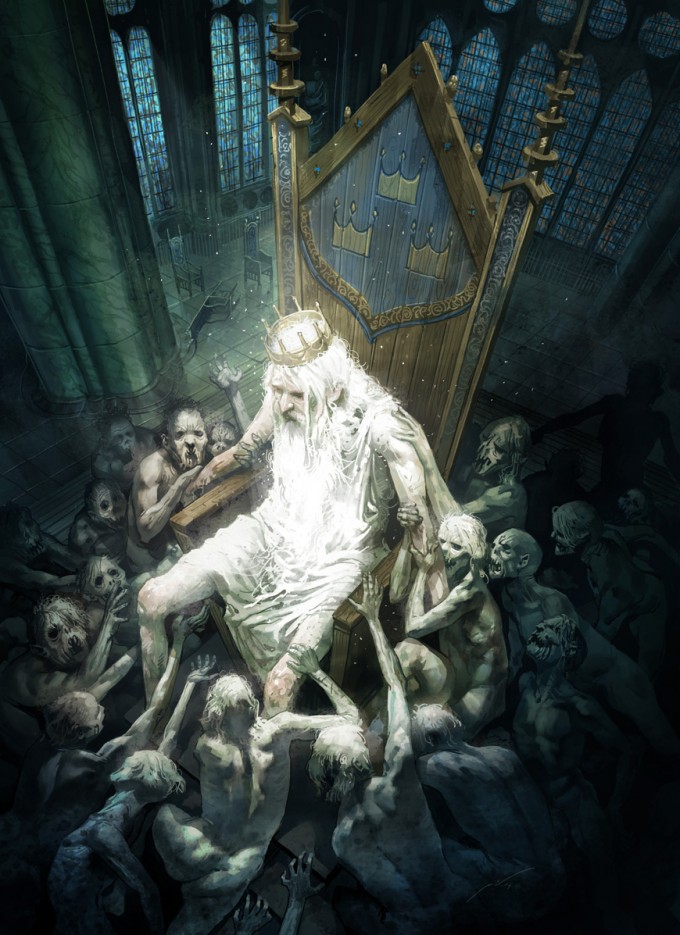

The Transcendent
To be buried with honors is, for most societies, a respectable goal in and of itself. Some peoples, though, have discovered ways to bestow the deceased with radiant energy. In this way, it is possible to sustain the champions of the world indefinitely-- to honor them not through death, but beyond it.
The Deathless of Eberron are the most well-known example of this path, but the transcendent represents noble creatures as well as the neutral arbiters of the dead. Those who control radiant and necrotic energies to pursue perfection are best represented through the Rite of the Transcendent.
Awaken Radiance
Starting at 2nd level, when completing a short rest, you may recover a number of expended spell slots up to a maximum of half of your lich level (rounded down). You may then choose a number of creatures up to your Intelligence modifier within 60 feet. Those creatures gain a number of temporary hit points equal to half of your lich level (rounded down).
Once you use this ability, you may not do so again until you complete a long rest.
Assert Immortality
At 6th level, whenever you would be reduced to 0 hit points, you may instead drop to 1 hit point. When you use this ability, you may choose a number of creatures within 30 feet of you. Those creatures take 3d6 radiant or necrotic damage (your choice) with no saving throw. You must choose the same damage type for all affected targets.
Once you use this ability, you may not do so again until you complete a long rest.
Master of Energies
Your power over the forces of life and death reach new heights. You thrive off of the twilight energies in your environment, and can lace your spells with darkness or light.
Starting at 10th level, whenever you cast a spell that deals damage, you may choose to convert half of that damage (rounded up) into radiant or necrotic damage. For example, using this ability while casting fireball would result in a fireball that deals either half fire, half radiant damage... or half fire, half necrotic damage.
You may use this ability once per point of proficiency bonus, and may recover any expended use upon completion of a long rest. You may only use this ability once during the casting of a spell.
In addition, whenever one or more creatures is reduced to 0 hit points or less within 60 feet of you, if radiant or necrotic damage was dealt to the creature as part of the killing blow (such as from a paladin's smite), then you may choose up to one creature within 60 feet of you. Both you and the chosen creature recover hit points equal to 1d6 + your proficiency bonus. You may only use this ability once per round.
.
art by Pierre Droal
Deathless One
At 13th level, if a spell, such as raise dead has the sole effect of restoring you to life, the caster doesn't need material components to cast the spell on you.
In addition, you are always treated as though you are humanoid (rather than undead) for the purposes of spells that restore you to life. When you are revived, you always return in your undead form.
Innermost Light
Your body has become a true beacon of immortal power. Creatures that approach you cannot help but feel awed (or terrified) by what you represent. At 18th level, any creature who targets you with an attack or a harmful spell must first make a Wisdom saving throw against your spellcasting save DC. On a failed save, the creature must choose a new target or lose the attack or spell. This ability doesn't protect you from area effects, such as the explosion of a fireball.
If you make an attack or cast a spell that affects an enemy creature, that creature becomes immune to this ability for 24 hours.

Lich Cohorts- Miscellany
Challenge Rating for Liches
The following challenge ratings are based on the Monster Statistics by Challenge Rating table on page 274 of the Dungeon Master's Guide. Note that the below numbers were calculated without accounting for equipped magic items.
As a point of reference: The average level 20 player character may have a CR around 12-14 depending on the character's build and magic items, and can become higher still when using an optimized build and powerful items.
| Cohort Level | Recommended CR |
|---|---|
| 1 | 1/2 |
| 2 | 1/2 |
| 3 | 1 |
| 4 | 2 |
| 5 | 3 |
| 6 | 3 |
| 7 | 3 |
| 8 | 4 |
| 9 | 5 |
| 10 | 5 |
| 11 | 6 |
| 12 | 6 |
| 13 | 7 |
| 14 | 7 |
| 15 | 7 |
| 16 | 8 |
| 17 | 9 |
| 18 | 10 |
| 19 | 11 |
| 20 | 12 |
Roleplaying as a Lich
In most settings, the lich is seen as the ultimate evil... and for good reason. A classic lich, by definition, is a creature so self-consumed that it would deny the afterlife to others just to prolong its own existence. If 'good' means 'selfless' to a degree, then the lich is the antithesis of all that is decent in the world. Is it possible to portray a lich that does not stoop to such depths? The short answer is yes, but only if one accepts that such a lich would be atypical at best, and would almost never be considered truly 'good'.
To roleplay as a lich without coming across as a complete villian... you must consider why, exactly, your character has chosen this path to immortality. In the case of a dread lord (in other words, a classic lich), a life of purity may indeed be impossible. A dread lord has made the decision to prioritize themselves over the lives of others, period.
Is there a reason your character believes their life is so important?
What if your character is engaged in research that could save the world from utter destruction? Sacrificing the souls of a few nameless fools may then serve a greater purpose. What if the sacrifices are from willing subjects? The ethical and moral implications there could make for an interesting character hook. One could roleplay as the reluctant leader of a sacrificial cult, and without your leadership they could go on to perform even more insidious acts. You might be the leash that contains the metaphorical beast.
In the case of a transcendent, the skills one would learn may be similar to a classic lich, but might come from a different path entirely. For example, you might learn knowledge that is forbidden not because it is evil, but because it is only available to those deemed worthy. As a being that masters both radiant and necrotic energies, the transcendent has some flexibility in how they see the world. One could be the champion of a secluded people, who has been reanimated (or transformed) to serve their home for eternity. A transcendent could be a sort of demigod that judges the dead, determining who else is or is not worthy to learn their secrets.
That said, just because a transcendent makes use of radiant energy does not guarantee that they are truly 'good'. A transcendent may be a zealot who destroys those deemed 'impure' by their standards. A champion of one people may be the scourge of another.
For more examples of transcendents, one might look into the Deathless of Eberron (the Undying Court) or, for a more neutral path, consider the possibility of a revenant (undead who are reanimated by their quest for vengeance) but with an undying light that guides them.
Liches as PCs
Compared to some of the other creature cohorts, liches were designed from the start to be fairly seamless between their cohort and player character versions. That said, some adjustments are still recommended when playing a lich character:
- Allow the lich character to choose a background normally.
- At higher levels, the lich becomes fully undead... and many types of healing will no longer work on them. While both the dread lord and transcendent have healing options, consider the Amulet of Anti-Divinity below for undead PCs.
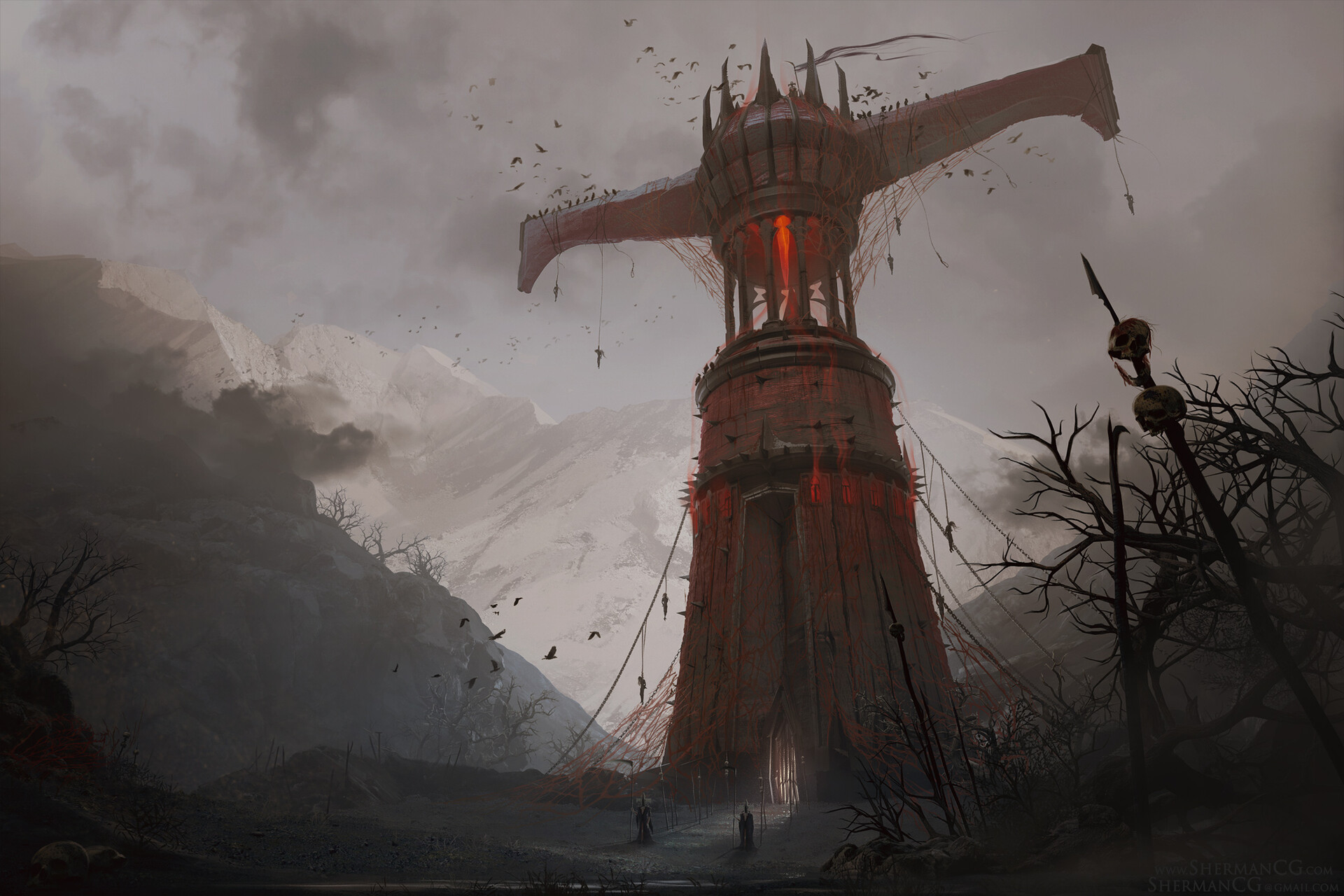

art by Isaiah Sherman
Amulet of Anti-Divinity
Wondrous item, uncommon (requires attunement by an undead character) When you attune to this amulet, choose necrotic or radiant damage. You have advantage on saving throws against spells and abilities that deal the chosen type of damage.
In addition, whenever an ally within 30 feet targets you with a spell that deals the chosen type of damage, you can choose to fail the saving throw. Instead of taking the chosen type of damage, you regain a number of hit points equal to half of the damage (rounded up) that would have been dealt.
.
Credits
Cover Art by Derrick Zha (www.artstation.com/derrickzha) Page 2 Art by Fran Fdez (www.artstation.com/fran_fdez) Page 3 Art by David Astruga (www.artstation.com/davidastruga) Page 5 Art by Vyach Milinchuk (www.artstation.com/milvyach) Page 6 Art by Xavier Leroux (www.artstation.com/coffeeater) Page 7 Art by Anato Finnstark (www.artstation.com/anto-finnstark) Page 8 Art by JasonTN (www.deviantart.com/jasontn) Page 9 Art by Anna Marcano (www.artstation.com/annamarcano) Page 11 Art by Pierre Droal (conceptartworld.com/artists/pierre-droal/) Page 13 Art by Isaiah Sherman (https://www.artstation.com/shermancg) Back Cover Art by Sergey Vasnev (https://www.artstation.com/sergey_vasnev) Watercolor stains by Jared Ondricek (https://watercolors.giantsoup.com/xgte/xgtebottom-left/index.html)


May Your
Sidekick
Live Forever
Creature Cohorts were created by me, Mister_Thr33, and were inspired by Tasha's Cauldron of Everything as well as the 3rd Edition supplement Savage Species
'Creature Cohorts' is unofficial Fan Content permitted under the Fan Content Policy. Not approved/endorsed by Wizards. Portions of the materials used are property of Wizards of the Coast. ©Wizards of the Coast LLC.
No souls were consumed in the creation of this document
Thank you all for your support!